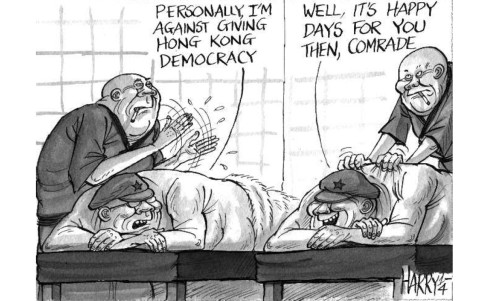
Some senior Chinese cadres oppose universal suffrage for Hong Kong, says source

Some senior mainland cadres believe it would be wrong to grant Hong Kong universal suffrage unless tight restrictions are imposed and that the decision in 2007 to allow "one man, one vote" in 2017 was unwise, a local source familiar with Beijing's policies on Hong Kong says.
The source also told the South China Morning Post yesterday that many cadres would be pleased to see Hong Kong lawmakers veto reforms for the 2017 chief executive election.
The source said the need to appease wary cadres was the reason the National People's Congress Standing Committee set a tight framework for reform, including limiting the number of candidates and demanding that they win majority support from a nominating committee.
Article 45 of the Basic Law states that electing the city's leader by universal suffrage is the "ultimate aim", but sets no date and says "the principle of gradual and orderly progress" should apply, taking into account "the actual situation in Hong Kong". The Standing Committee ruled in 2007 that universal suffrage could be implemented in 2017.
But the source said: "Some senior mainland officials do not want to see universal suffrage introduced in Hong Kong at all.
"They believe that the central government leadership's decision in 2007 … was unwise and not well thought-out.
"Those Hong Kong people who oppose the framework may not realise that many Beijing officials will be happy to see Hong Kong's electoral methods stay as they are."
However, the source said, other senior cadres were keen to see universal suffrage. Wang Guangya , director of the State Council's Hong Kong and Macau Affairs Office, was cited as an example. Wang, 64, wanted to see it achieved before he retires next year, the source said.
The Standing Committee ruled only two or three candidates could run and they would need majority support from a nominating body based on the election committee for the 2012 poll. Pan-democrats said they would veto the proposals.
Meanwhile, the British government said yesterday it recognised that the universal suffrage model laid down by Beijing for Hong Kong "will disappoint", but it made no mention of its obligations under the 1984 Sino-British Joint Declaration.
A day earlier, Chris Patten, Hong Kong's last governor, had urged London to stand up to Beijing, as it had a "moral and political obligation" to the city, having co-signed the 1984 treaty, which says Hong Kong should enjoy extensive autonomy under "one country, two systems".
In a statement, Britain's Foreign Office said: "We welcome the confirmation that China's objective is for the election of Hong Kong's chief executive through universal suffrage …
"While we recognise that there is no perfect model, the important thing is that the people of Hong Kong have a genuine choice and a real stake in the outcome."
Hong Kong government officials and establishment figures had earlier hit back at Patten.
Chief Executive Leung Chun-ying said: "Hong Kong's constitutional development under the Basic Law is an internal affair of our country and a matter for the central authorities and our people to decide."
Rita Fan Hsu Lai-tai, an NPC Standing Committee member, said Patten was looking at Hong Kong issues from a "pre-handover viewpoint".
Asked to comment on the Foreign Office statement last night, Martin Lee Chu-ming, founding chairman of the Democratic Party, said: "Shameful. Totally irresponsible."
He added: "Asking Hongkongers to pocket the imperfect [reform] model would be tantamount to selling them down the river for 30 pieces of silver."
